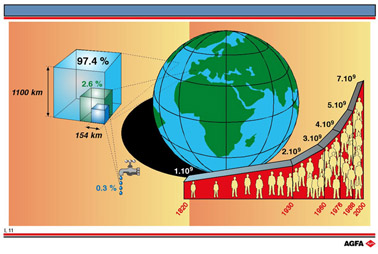L11 Provision of drinking water: a problem for the future
Aim: To show that drinking water will become scarcer as the world’s population increases. |
On Earth there is an
abundance of water. The total supply has been estimated to be 1.38 x 109 km3.
Most of this (97.4%) is salt water in the oceans and is not therefore directly usable as
drinking water. Only a small amount of the remaining fresh water(3.6 x 106 km3)
is suitable for drinking.
The World’s population is increasing exponentially: in 1820 there was a world
population of 1billion, by 1960 this had grown to 3billion and estimates for the year 2000
predict a World population greater than 7billion!
This means an ever decreasing amount of drinking water available per person.
However, this is not the only reason why we should be sparing in our use of water. As more
and more water is pumped out of the ground so brackish water seeps in to replace it.
Pollution of the soil by excessive use of fertilizers gives rise to high nitrate
concentrations in the water and pollution of water with hydrocarbons can give rise to
serious contamination.
Surface water is increasingly being used for
the provision of drinking water. This can be an expensive procedure if the surface water
is polluted. The pollution of rivers must therefore be discouraged.
The Rhine, for example, is much cleaner now than some years ago thanks to great efforts by
all the industries along the river.
The high cost of drinking water provision means that is uneconomical to use this water for
washing cars, watering the garden and flushing the toilet. Less pure water is satisfactory
for this purpose and every family should be encouraged to participate in water saving
measures.
Maybe in the future there will be two water supplies to every home; one carrying drinking
water and the other carrying less pure but cheaper water.
Whatever the future, one
thing remains essential:
Don’t waste water!
